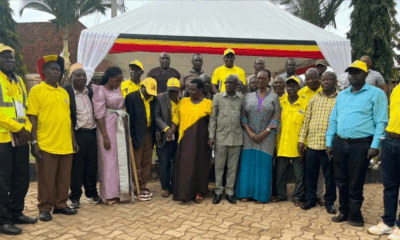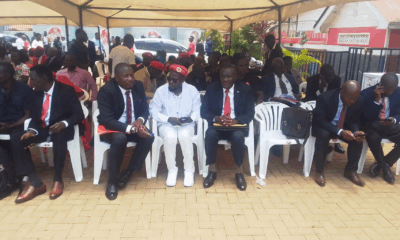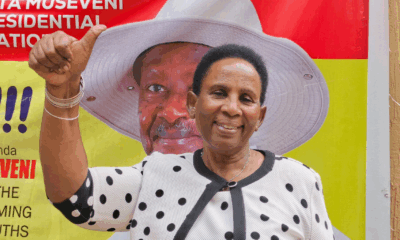Politics
A Deep Dive into the Proposed UPDF Amendment Bill 2025
Today marks a potentially transformative moment for Uganda’s military justice system and command structures as the government tables the Uganda People’s Defence Forces (UPDF) Amendment Bill 2025 in Parliament. This comprehensive piece of legislation, spurred by recent Supreme Court pronouncements and a recognised need to modernise the existing 2005 UPDF Act, signals a significant effort to redefine the boundaries of military law, enhance the independence and professionalism of military courts, and improve the welfare of service personnel.
At its core, the bill seeks to address the contentious issue of civilian trials in military courts, a point of significant legal debate culminating in the Supreme Court’s January 31st ruling. By explicitly outlining specific circumstances under which civilians can be subjected to military law – namely, unlawful possession of military-grade firearms or equipment, aiding and abetting military personnel in grave offences, and unauthorised use of UPDF uniforms – the government attempts to carve out a legally defensible jurisdiction for military courts over certain civilian actions.
This move, while seemingly adhering to the Supreme Court’s directive to limit such jurisdiction, will undoubtedly face scrutiny regarding its scope and potential implications for civil liberties. The designation of civilians committing uniform-related offences as “militants” with a military rank, albeit potentially revocable, raises intriguing questions about the application of military discipline and hierarchy to non-military individuals.
The proposed restructuring of the courts martial represents a significant step towards enhancing their judicial capacity and perceived independence. Elevating the qualification of the General Court Martial chairperson to someone eligible to be a High Court judge and holding a rank of at least Major General injects a higher degree of legal expertise and seniority into the system. The inclusion of civilian advocates of the High Court alongside senior military officers who are also advocates further strengthens the legal foundation and potentially fosters a more balanced perspective within the court.
The appointment of all members by the High Command in consultation with the Judicial Service Commission, coupled with fixed renewable terms, attempts to strike a balance between military authority and judicial oversight, though the extent of the Judicial Service Commission’s influence in this consultation will be a key point of analysis. The explicit assertion of judicial independence for court martial members is a welcome development, aiming to insulate them from undue command influence in their decision-making processes.
The introduction of a clear appellate pathway to the Court of Appeal for those dissatisfied with court martial decisions is a crucial step towards ensuring accountability and upholding the right to a fair trial. Furthermore, the requirement for Supreme Court confirmation of death sentences imposed by the General Court Martial adds a vital layer of judicial review for the most severe penalties. These provisions address concerns about the finality and potential for error within the military justice system.
The establishment of unit and division court martials with clearly defined jurisdictions and chairpersons with legal qualifications signifies an effort to decentralize and streamline the handling of less severe offenses within the military. The inclusion of diverse representation within the unit court martials, including administrative and political officers alongside rank-and-file soldiers, could foster a more holistic understanding of the context surrounding alleged offenses.
Beyond the judicial reforms, the bill proposes a formal legal framework for key military command structures like the High Command, Special Forces Command, and Joint Military Command. Codifying the composition and roles of these bodies provides greater clarity and potentially strengthens institutional accountability. The inclusion of individuals who were part of the High Command in 1986 (provided they meet certain criteria) offers a nod to the historical context of the UPDF’s formation while also setting clear parameters for such inclusion. The creation of the Deputy Chief of Defence Forces and Inspector General of Defence Forces positions to oversee the Special Forces Command suggests a growing recognition of the specialized nature and strategic importance of this arm of the military.
The provisions aimed at improving soldier welfare, particularly the introduction of monthly disability compensation, helper’s allowances, and enhanced pension benefits for officers disabled in service, represent a significant and commendable step. These measures acknowledge the sacrifices made by service personnel and aim to provide a more robust safety net for those who suffer injuries or disabilities while serving the nation.
The establishment of a Medical Board to assess the medical condition of affected officers adds a layer of professional and standardised evaluation to the process. Similarly, the proposed pension and gratuity provisions for retired officers, with considerations for early death and a defined search period for missing personnel, offer greater security and clarity for those transitioning out of active service and their families.
The genesis of this bill, rooted in the Supreme Court’s ruling on the limitations of military court jurisdiction over civilians, underscores the dynamic interplay between the judiciary and the executive in shaping legal frameworks. The government’s swift response in drafting this comprehensive amendment bill demonstrates a willingness to adapt to judicial pronouncements and address perceived shortcomings in the existing legislation. However, the extent to which the proposed amendments fully align with the spirit and letter of the Supreme Court’s ruling, particularly regarding the trial of civilians, will be a subject of intense legal and public scrutiny.
In conclusion, the UPDF Amendment Bill 2025 represents a potentially far-reaching overhaul of Uganda’s military justice system and command structures. It addresses critical issues raised by the judiciary, seeks to enhance the professionalism and independence of military courts, and aims to improve the welfare of military personnel. However, the practical implementation and the long-term impact of these proposed changes, particularly concerning the jurisdiction over civilians and the balance between military authority and judicial oversight, will be crucial areas to observe as the bill progresses through Parliament and into law. The debates and discussions surrounding this bill will undoubtedly shape the future of military justice and the broader relationship between the military and civilian society in Uganda.
Comments



























